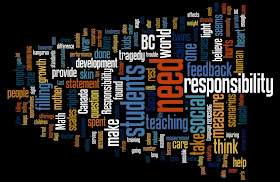Pages
▼
Monday, 15 April 2013
What do students need. . .BETTER ANSWER
Last blog entry, I started with Stats Canada to tease out what we need to be teaching our students. Today, 2 bombs exploded injuring and killing people in Boston. Sharing that our kids need some training in sales seems pretty low on the totem pole, right now. So in light of utter tragedy, I must express that there are things that we need to teach our children that have nothing to do with Math or Language Arts. . .or selling.
Social Responsibility is how we in BC, Canada bring ethics into our curriculum. And to be quite honest, when the offerings for social responsibility Pro D workshops are pitted against the technology ones, I have often found myself learning about Del.icio.us or Twitter when my colleagues are delving into teaching kids to make the world a better place. But it seems that more and more, we need all our resources. . .every available influence. . .to wage war against a world with a tendency to take care of "number one".
In BC, our social responsibility strands include: CONTRIBUTING to the classroom and school community, SOLVING problems in peaceful ways, VALUING diversity, DEFENDING human rights, and EXERCISING DEMOCRATIC rights and responsibilities. In light of the tragedy today, could there be anything more important that instilling values such as these in our students.
But the real question is how is it done. How do we teach people to be socially responsible. A quick perusal through the October 2001 BC Social Responsibility Framework and you'll see that the scales are voluntary. The framework provides opportunities to measure the level of social responsibility through "what would you do" scenarios (be it washing dirty car parts in a nearby salmon inhabited stream or helping someone who was having trouble with her locker.) This begs the question: if we measure the students and provide feedback, will that cause students to take another step towards altruism, compassion, selflessness, kindness. I don't think so.
I believe the work done to formulate the social responsibility performance standards was not wasted. I think it is helpful to measure and provide feedback. I don't, however, think that measurement and feedback is enough. So what takes us from writhing id's to thoughtful super egos? What causes a once self-oriented child to become a sacrificial mother? What sends a cut throat businessperson into the heart of Africa to spend the rest of his life serving orphans? This goes beyond "what if" scenarios and 4 point rating scales.
Mother Theresa said: "I have found the paradox, that if you love until it hurts, there can be no more hurt, only more love." What keeps us from loving until it hurts?
I am going to make a statement about humanity here. It's a general statement, but one that connects the dots between our desire for good and our own self centeredness: we are empty.
People are empty. And they need filling. They need a whole lot of filling. The human spirit needs nurturing. And we cannot neglect the inner part of ourselves. As I said, it is war. And we need the Math teacher and the soccer coach and the dance instructor to take up arms.
My twins were born at 30 weeks. They spent their first few days in a tray attached to wires. They spent the week after that in an incubator, separated from their mother and I. When I would come to NICU, the nurses would ask me to do "kangaroo care". This meant that I would unbutton my shirt and have one of the twins rest on my chest. This skin to skin contact, said the nurses, would help to stabilize the child, normalizing temperature, heart rate, respiratory rate, weight gain. The effects can be seen in cognitive development, reduced stress, motor development and proper growth. How could I refuse. So there I would sit for as long as I could to help.
When the filling happened, the growth was made possible. I believe it is the same way with our students. Without that, all the teaching in the world wouldn't make a bit of difference.


No comments:
Post a Comment